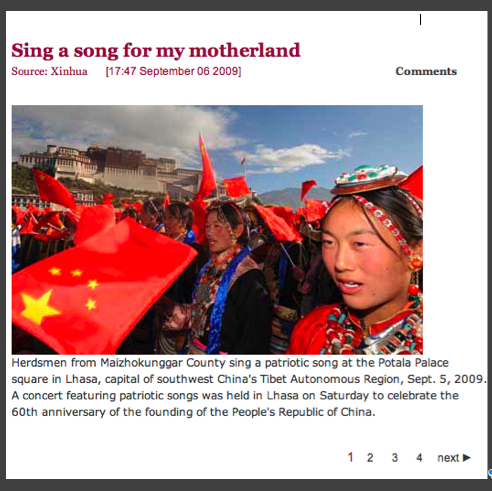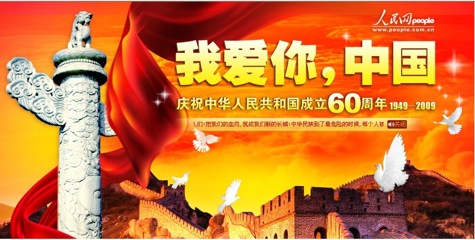By Qian Gang and David Bandurski — This has been a delicate year for China’s leaders, who must cross a veritable minefield of sensitive anniversaries. There was the 90th anniversary of the May Fourth Movement, the 50th anniversary of the Lushan Conference, the 20th anniversary of June Fourth. And of course we have, just around the corner, the 60th anniversary of the founding of the People’s Republic of China.
China is now in the midst of preparations for a National Day celebration that should by any standard be extravagant. Although the English-language Global Times managed to say in a single breath this week that “the ‘warm but frugal and cost-effective’ celebration” would include a “grand military parade and a mass pageant featuring 200,000 people.”
Meanwhile, the propaganda war for people’s hearts and minds has long been under way.

[ABOVE: “National unity” is one of the five “main themes” for National Day coverage. Screenshot of coverage at Global Times. A quick show of hands: how many think this photo is real?]
Media in China may view the National Day celebrations as a golden opportunity to cash in and enhance their commercial reach and influence. But China’s leadership views this event as an internal affair of paramount political importance, and as a key strategic front along which to tighten news controls.
It was way back last spring that China’s Central Propaganda Department conveyed its overall position on reporting of the 60th anniversary: “Shout throughout the whole of society the main themes of the goodness of the CCP, the goodness of socialism, the goodness of opening and reform, the goodness of our great motherland, and the goodness of our various ethnic groups.”
These five points, which are referred to as the “five goods,” essentially define the permissible scope of 60th anniversary coverage.
The term “main theme,” or zhǔxuánlǜ, is specific to public opinion controls (舆论控制) in China. The “main theme” refers to the general orientation and message the authorities expect news media to reflect.
So, to sum up, the crucial motifs for news reporting on the 60th anniversary are:
1. The leading position of the Chinese Communist Party
2. The strength of the socialist system
3. The importance of opening and reform
4. Patriotism
5. National unity
The demands the authorities have placed on reporting this year are essentially no different from those we saw for the anniversary ten years ago. But despite an overriding emphasis on Jiang Zemin’s policy of “guidance of public opinion” then, 1999 was a year of relative vitality for China’s media.
At the time, CMP Director Qian Gang was managing editor of the more freewheeling newspaper Southern Weekend, which on National Day that year ran a front-page editorial calling for political reform. “From a Society of Subjects to a Civil Society,” it was called (从臣民社会到公民社会), and it argued that rule by the people “is the stamp of a civil society” and “the moral foundation of the legitimacy of our government.”
In 2009, statements like this already seem unimaginable.

[ABOVE: Screenshot of a People’s Daily Online page, “I love you, China,” devoted to National Day.]
In June 2008, Hu Jintao introduced his new policy for handling news and information, which placed a strong emphasis on the notion of “public opinion channeling.” This is all about state media taking the initiative in getting the news out quickly, so that at least some critical information, particularly about breaking news events, is made public in record time. This more active posture was reflected to a limited extent during last year’s Beijing Olympics, but this year’s 60th anniversary has offered a stark contrast.
The Beijing Olympics were an international affair. Under the glaring lights of world attention, the authorities took a somewhat more open stance on press controls, even if this brought no relief for Chinese journalists.
The 60th anniversary is a “household affair,” China’s own business, and with social and political stability as the overriding domestic priorities the authorities are exercising strict control over the media.
The heart of the five “goods” is the “goodness of the Chinese Communist Party,” which means that the party’s leadership position is beyond question, and that the CCP’s accomplishments are resplendent and undeniable. As for the errors and blunders of the past 60 years, the human tragedies and buried injustices, these cannot be addressed at all.
Propaganda controls notwithstanding, the 60th anniversary will inevitably become an occasion to reflect back on sixty years of Communist Party rule. Whether or not CCP leaders are capable of taking an earnest and clear-eyed look at the party’s own record will be a key test of the party’s leadership.
But the initial signs are not encouraging.
The sensitivity of June Fourth is without question — this is a topic no media can be expected to broach. But so far even such episodes as the Anti-Rightist Movement of 1957 and the actions against rightists during the Lushan Conference of 1959, events on which the party long ago pronounced its official verdict, have become dangerous topics ahead of the 60th anniversary. Why? Because they touch on the crimes of Mao Zedong and on the serious failings of China’s political system.
Major web portals in China have planned a number of historical retrospectives, each of which highlights one important event during every year since 1949. Sohu.com has posted special features called “History in the Twinkling of an Eye” (回望历史瞬间) and “30 Years of Reform” (改革开放叁十年). Netease has one called “Made in China” (中国制造). The official Xinhua Online has a retrospective called “Footprints of the Republic” (共和国的足迹).
But what sort of events and landmarks do these highlight?
The Anti-Rightist Movement, during which some 550,000 people were politically persecuted as rightists, and millions of others dragged down into the chaos, was surely the defining event of 1957. Is it there? No, of course not.
The Great Starvation, which claimed the lives of some 36 million people, and the crushing of moves to promote democracy within the party, both resulted in large measure from the political madness of the Lushan Conference. Surely, that event merits attention in a historical retrospective.
But can we find it in 1959? No, of course not. We find at best fleeting references.
For 1957, Xinhua Online mentions “rectification within the party,” but includes only very light treatment of the campaign against rightists. QQ.com chooses to focus on Mao Zedong’s criticism of Ma Yanchu’s proposals on limiting population growth in China, but sidesteps the whole Anti-Rightist Movement. Sohu.com mentions the destruction of Beijing’s city wall in 1957. Netease notes only the conclusion of China’s first Five-year Plan.
For 1959, Xinhua Online highlights the putting down of rebellion in Tibet. Sohu.com notes the general pardon issued for war criminals and former Nationalist officials (as well as many “counterrevolutionaries”) to commemorate the republic’s tenth anniversary. Netease and QQ both choose to focus on the 1959 discovery of the oil field in Daqing.
None of these major web portals dared devote coverage to the Lushan Conference.
Two portals, Netease and QQ, did offer online polls that allowed users to select what they saw as the major events during particular years, and these included events like the Anti-Rightist Movement and the Lushan Conference. But these episodes in history could not be elaborated, and they could not become major defining events for those years.
In fact, we understand from our sources that user comments in the online polling sections of these sites are being actively removed. Forums for online comment have seemed unprecedentedly cold and cheerless ahead of the anniversary.
Websites have also been handed an explicit notice by the authorities letting them know that these two topics – the Anti-Rightist Movement and the Lushan Conference – are of extreme sensitivity.
In a moment of high spectacle, we have struck a new low. And this side-stepping of major episodes in China’s history does significant damage yet again to the credibility of China’s media.
[Posted by David Bandurski, September 10, 2009, 3:57pm HK]
[For reference, we publish the full Chinese text here of the 1999 editorial by columnist and CMP fellow Yan Lieshan (鄢烈山) published on the front page of Southern Weekend to commemorate China’s National Day.]
从臣民社会到公民社会
——庆祝中华人民共和国成立50周年
鄢烈山
50年前的今天,古城北京举行开国大典,毛泽东主席在天安门城楼上向全世界庄严宣告:中华人民共和国中央人民政府成立了!这位无产阶级革命家和政治家,用他特有的富于诗意的语言,简洁明快地揭示了这个伟大历史事件的深厚意蕴:“占人类总数四分之一的中国人从此站立起来了。”
中国人民从此站起来了!不言而喻,从前中国人民是跪着的,是俯伏着的。难道不是这样吗?几千年来,中国是一个封建君主专制的臣民杜会,“普天之下,莫非王土;率土之滨,莫非王臣”。家天下兴,百姓苦;家天下亡,百姓亦苦。自上个世纪中叶,帝国主义列强以炮舰轰开我们的国门,一百多年里,这群强盗杀我人民,割我领土,索我“赔款”,神州大地被浸没在一片血与火的海洋之中。
然而,中华儿女是有血性有骨气的,中华民族岂甘忍受任人宰割的命运?他们要推翻内外压迫者,赢得生而为人的权利与中华民族的尊严。他们中的先进分子披荆斩棘探寻着救国救民的真理。他们曾试图“师夷长技以制夷”。 1894年(甲午)中日之战的失败宣告了“洋务运动”的失败和“中体西用”道路的破产;1905年日本战胜沙俄,更使国人看到了“立宪”对于富国强兵的重要性。人们认识到,所谓坚船利炮并非仅仅是器物制造技术的成果,军事实力与战争动员能力并非无源之水、无本之木,中国只有在政治经济等事关根本的制度层面变法维新,才能改变积贫积弱受人欺侮的局面。目睹无数血写的事实,大多数的中国人才达成共识,以“宁赠友邦,勿予家奴”为信条的腐朽卖国的封建王朝若不彻底推翻,中华民族就不可能避免亡国亡种的灾祸,起而拥护孙中山领导的“目的在求中国之自由平等”的民主革命。
从“五四”新文化运动到八年浴血抗战,到推翻国民党蒋家王朝建立新中国,“民主”,一直是引领中华民族踏平坎坷,走向胜利的光辉的旗帜。在战争最艰苦的阶段人们憧憬着新中国,他们发自内心深处地歌唱“没有共产党就没有新中国”,因为看到“她建设了敌后根据地,她实行了民主好处多”,相信“她一心救中国,她指引了人民解放的道路”。几千年来被“治”得一盘散沙的中华民族,何以有了空前团结一致的凝聚力,这力量比铁还硬,比钢还强?因为人们是在向法西斯蒂开火,是要让一切不民主的制度死亡,是亘古未有的民主信念“向着太阳,向着自由,向着新中国发出万丈光芒!”
中华人民共和国的诞生,其所以是划时代的,是因为它意味着,中华民族从此可以挣脱被束缚被奴役的命运。对外,赢得了国家独立解放,将以爱好和平自由的姿态成为世界各民族大家庭中平等的一员;对内,赢得了人民当家作主,各族人民将以勤劳勇敢正直的品格组成一个在法律面前人人平等的“公民杜会”。人民当家作主,是“公民社会”的本质特征,它不仅是语言学和政治学家给出的“人民共和国”这个词语的含义,而且是我们的立国之本,是我们这个政权的合法性的道义基础,是我们的社会主义制度区别于一切剥削阶级专政制度的真义和正义所在。
“天下为公”,“天视自我民视,天听自我民听”,可以说是中华民族的祖先最久远的关于公民社会的理想,但几千年来一直是个乌托邦。在世界史上,从中世纪的“主权在神”到宗教革命后的“主权在君”,再到18世纪启蒙时代以来形成“主权在民”的思想,国际社会普遍承认“民主”的涵义,是人民参与政治过程井赋予政府行为的合法性,国家政权是为人民服务的公器而不是少数人作威作福的工具,是保障公民自由与人权的盾牌而不是少数人滥用权势的利器;但理论不等于是现实,资本主义社会的民主只能是资产阶级的民主。中国共产党领导人民进行革命,建立新中国,而今又领导人民进行社会主义建设和改革,正如江泽民同志所说,“是要实现全中国人民的自由、民主和人权。”我们的民主理应是最广泛最真实的民主,虽然这仍然是我们须不懈追求的目标。
正是努力实行最广泛的人民民主,中国人民有了当家作主的感觉,才焕发出了前所未有的劳动积极性和首创精神,让中华大地涌现出蓬勃的活力和生机,用不长的时间在旧中国一穷二白的基础上,建立了比较完整的工业体系和国民经济体系。也恰是由于党和国家的政治生活后来违背了民主集中制的原则,出现了个人专断,“运动”群众进行所谓“大民主”,使中国人民经历了以“文革”为高潮的极“左”路线造成的大劫难。党的十一届三中全会拨乱反正,邓小平同志领导全党全国人民总结“文革”和.建国后的经验教训,他旗帜鲜明地提出:“没有民主就没有社会主义,就没有社会主义的现代化。”并高瞻远瞩地指出:“为了保障人民民主,必须加强法制。必须使民主制度化、法制化。”
遵循邓小平的理论,20年来,我们大力发展社会主义民主,健全社会主义法制,努力改变“无法无天”的局面,切实保障人民当家作主,参与管理国家事务和社会事务、管理经济和文化事业的权利,成就有目共睹。《中华人民共和国宪法》修正案庄严地载入了“建设社会主文法治国家”的目标;《中国共产党章程》庄重承诺(也是规定):“党必须在宪法和法律的范围内活动。”从此,任何组织和个人都不再享有超越宪法和法律的特权。作为现代民主国家依法治国基本方略的成果,这些年我国先后制定了一系列实体法和程序法。为防止滥用行政权力,保障公民的自由与人权,我国于 1989年出台了《中华人民共和国行政诉讼法》,为“秋菊”们民告官“讨说法”提供了法律依据;今年又颁布了《行政复议法》,强调以法律作为判别是非的标准,开始改变以权力为标准的传统状况。此外,如《国家赔偿法》的颁行,新的刑事诉讼法对无罪推定原则的采用,都是中国公民权利得到前所未有的保障的显证。与此同时,村民自治、厂务公开、政务公开等一系列民主建设正在展开,我国人民正在逐步提高对杜会与公共事务管理的发言权。尤其值得大书特书的是,二千年来我们不断解放思想,打破形形色色的精神桎梏,确立了建立社会主义市场经济体制的伟大目标,努力为全体公民创造发挥个人潜能,参与平等竞争获取成功的机会,极大地解放了社会生产力,也切实提升了人民的生活水准和人格尊严。
不必讳言,在我们这样一个有长期封建主义传统,经济和教育欠发达的国家,要达成完全的民主与法治,实现充分的自由与人权,还需要经过相当长时间的艰苦奋斗。官贵民贱的等级制思想和“官本位”的封建遗风,吏治腐败、司法腐败等种种严重腐蚀政权、涣散人心的丑恶现象,它们的存在与蔓延,是与人民共和国的国体绝不相容的。历史的经验告诉我们:对外,若国家没有完整的独立的主权,就不可能保障本国公民的人权;对内,若人民没有当家作王的权利,则不可能实现杜会安定、经济发展和综合国力的强盛,以维护国家主权。两者是互相关联、积极互动的关系。因此,作为中华人民共和国的公民,作为真正的爱国者,为了增强我们国家的经济实力和国防实力,为了增进中华民族对人类社会的影响与贡献,我们必须以高度的历史使命感加强社会主义民主与法治建设,促进政治民主化、经济市场化和社会治理法制化,从而增强民族的凝聚力。
自知者明,自胜者强。让我们在邓小平理论指引下,以更加成熟的理念,更加坚定的意志,深入推进政治和经济体制改革,扩大对外开放,扫除发展道路上的一切拦路虎,阔步迈向21世纪,创造光辉灿烂的未来,把我国建设成为一个富强民主文明的社会主义现代化国家,实现中华民族的伟大复兴!
来源:南方周末 来源日期:1999-10-1




















